
University of Pennsylvania Journal of International Law
Scope & Guideline
Innovating Thought in International Law
Introduction
Aims and Scopes
- International Human Rights Law:
The journal emphasizes the importance of human rights frameworks in addressing global challenges, often exploring how these laws are implemented and their implications for various populations. - Comparative Legal Studies:
A consistent focus on comparative analyses allows the journal to highlight differences and similarities in legal systems across jurisdictions, fostering a deeper understanding of international law. - Trade and Economic Law:
The journal addresses the complexities of international trade law and economic governance, particularly in relation to emerging markets and global economic policies. - Environmental Law and Sustainability:
A growing area of focus is the interaction between international law and environmental sustainability, reflecting the increasing relevance of climate change and ecological issues. - Technology and Law:
The journal explores the implications of technological advancements and digital globalization on international legal frameworks, particularly in areas like data privacy and cybersecurity.
Trending and Emerging
- Climate Change and International Law:
An increasing number of papers are addressing the intersection of climate change with international law, reflecting a growing recognition of environmental issues as central to legal discourse. - Digital Privacy and Data Regulation:
Emerging concerns regarding data privacy and the regulation of digital markets have become prominent, highlighting the need for legal frameworks that can adapt to rapid technological changes. - Human Rights in Conflict Zones:
There is a notable trend towards exploring the role of international law in conflict situations, particularly how human rights are upheld or violated in areas of instability. - Gender and Law:
The journal is seeing a rise in scholarship focused on gender issues within legal frameworks, particularly concerning rights recognition and equality in various legal contexts. - Global Health Law:
Recent publications suggest an emerging focus on the role of international law in public health, particularly in light of global health crises such as pandemics.
Declining or Waning
- Traditional Sovereignty Issues:
As global interconnectivity increases, traditional discussions around state sovereignty and territoriality are becoming less prominent, giving way to more complex legal interactions. - Historical Legal Analysis:
There seems to be a waning interest in purely historical legal analyses, with fewer papers focusing on historical precedents and more on contemporary applications of law. - Corporate Governance in Isolation:
The journal has moved away from examining corporate governance as a standalone topic, favoring discussions that incorporate broader international implications and human rights considerations.
Similar Journals

Asia Pacific Law Review
Illuminating Law: Insights from the Asia PacificWelcome to the Asia Pacific Law Review, a prestigious academic journal published by Taylor & Francis Ltd that serves as a vital resource for scholars, practitioners, and students in the field of law. With its ISSN 1019-2557 and E-ISSN 1875-8444, this journal critically examines legal issues pertinent to the Asia Pacific region and promotes scholarly discourse. Recognized in the Q3 category for law by the 2023 category quartiles, the Asia Pacific Law Review stands out with a Scopus ranking of #574 out of 1025, placing it in the 44th percentile within the Social Sciences _ Law category. Spanning from 2008 to 2024, the journal aims to present innovative research, policy analyses, and significant case studies that illuminate the evolving legal landscape in the region. While the journal does not offer Open Access, it remains an essential platform for high-quality legal scholarship, contributing to the advancement of legal knowledge and practice in the Asia Pacific area.

Revista Juridica de Castilla y Leon
Unlocking Contemporary Legal Insights for AllRevista Juridica de Castilla y Leon is a prestigious academic journal dedicated to advancing legal scholarship in the field of law and governance. Published by the JUNTA CASTILLA & LEON, CONSEJERIA PRESIDENCIA & ADM TERRITORIAL, this journal plays a vital role in disseminating high-quality research and foster dialogue among legal practitioners, researchers, and students alike. Since transitioning to Open Access in 2003, it has removed barriers to knowledge, allowing a global audience uncontrolled access to innovative legal studies and practices. With its ISSN 1696-6759 and E-ISSN 2254-3805, the journal is committed to publishing articles that address contemporary issues and challenges in the legal landscape, particularly those relevant to the Spanish context. As a reliable source for its readers, Revista Juridica de Castilla y Leon contributes significantly to the field of law, encouraging interdisciplinary research and collaboration to influence policy and improve legal frameworks in Spain and beyond.

Revista de la Facultad de Derecho
Exploring Contemporary Legal Issues with Scholarly RigorRevista de la Facultad de Derecho is an esteemed open-access journal published by the Universidad de la República, Facultad de Derecho, based in Montevideo, Uruguay. Since its inception in 2007, the journal has committed itself to disseminating high-quality legal scholarship, covering a wide range of topics within the field of law. With a dedication to promoting academic dialogue and advancing legal research, the journal serves as a vital resource for researchers, legal professionals, and students alike. The publication aims to foster discussions on contemporary legal issues while providing a platform for interdisciplinary insights. The journal is accessible online through its ISSN 0797-8316 and E-ISSN 2301-0665, ensuring that its content reaches a broad audience across the globe. With a focus on accessibility and scholarly rigor, the Revista de la Facultad de Derecho plays a pivotal role in advancing legal education and research in Latin America.
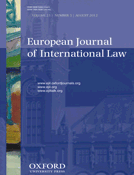
European Journal of International Law
Advancing the discourse on global legal frameworks.The European Journal of International Law (EJIL), published by Oxford University Press, stands as a leading platform for the dissemination of innovative research in the realms of International Law and Political Science. With an impressive ISSN of 0938-5428 and E-ISSN of 1464-3596, this prestigious journal has achieved Q1 rankings in both Law and Political Science and International Relations categories as of 2023, emphasizing its significance among contemporary scholarly publications. Spanning contributions from a diverse range of disciplines, the EJIL serves as an essential resource for researchers, professionals, and students alike, promoting critical dialogue on pressing international legal issues. Although currently not offered as an open-access journal, it continues to retain a high impact factor, as evidenced by its substantial Scopus rankings, placing it within the top percentiles in multiple categories. Its commitment to scholarly excellence is reflected in a convergence of research trends from 2005 to 2024, and it remains dedicated to fostering informed discourse on global legal frameworks and their implications.
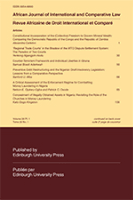
African Journal of International and Comparative Law
Empowering Legal Scholarship in the African ContextAfrican Journal of International and Comparative Law is a distinguished publication that serves as a vital forum for scholarly discourse in the fields of international and comparative law, with a specific focus on legal issues pertinent to the African continent. Published by Edinburgh University Press, this journal boasts a respectable impact factor and finds its reputation bolstered by its strategic ranking within the Q3 category of law, according to Scopus metrics, where it occupies the 681st rank out of 1025 journals. Although it does not currently offer open access, the journal remains committed to fostering legal scholarship and providing critical insights that bridge the gap between theory and practice. The journal's coverage encompasses scholarly articles, case studies, and analyses of contemporary legal challenges from 2005 to 2024, making it an indispensable resource for researchers, practitioners, and students dedicated to advancing their understanding of international and comparative legal frameworks in the African context. The editorial team encourages submissions that contribute to the dialogue on legal reforms, human rights, and the impact of globalization on African law.

University of Bologna Law Review
Empowering Legal Minds with Accessible ResearchUniversity of Bologna Law Review, published by UNIV STUDI BOLOGNA, ALMADL JOURNALS, serves as a pivotal platform for legal scholars and practitioners in the field of law. Established as an Open Access journal in 2016, it has committed itself to disseminating high-quality research and fostering vibrant discussions around contemporary legal issues. Based in Italy, the journal addresses a broad spectrum of topics within the realm of law, enhancing its reach and applicability. Although it currently holds a Q4 ranking in the 2023 law category according to Scopus, this reflects its potential for growth and contribution to academic discourse. The journal’s h-index and precise scope will be developed as it continues to publish groundbreaking research up to 2024. With an aim to cultivate educational resources and foster innovative legal thought, the University of Bologna Law Review is an essential resource for researchers, professionals, and students alike, harnessing the power of open access to engage a global audience.

International Community Law Review
Navigating Complexities of Global Justice.International Community Law Review, published by MARTINUS NIJHOFF PUBLISHERS, is a distinguished journal that contributes significantly to the fields of law and international relations. With an ISSN of 1871-9740 and an E-ISSN of 1871-9732, this journal serves as a vital platform for scholarly discourse on issues pertaining to international law, promoting a deeper understanding and engagement with complex legal frameworks and global challenges. Currently classified in the Q3 quartile for Law and Political Science and International Relations, the International Community Law Review ranks 475 out of 1025 in the Law category and 386 out of 706 in Political Science, reflecting a moderate impact in the academic community. Though it does not currently offer Open Access, the journal's extensive coverage from 2007 through 2024 ensures that it remains a relevant resource for researchers, professionals, and students. Published in the Netherlands, this journal aims to foster the development of international legal thought, support academic research, and facilitate discussions that shape modern international legal practices.
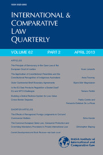
International & Comparative Law Quarterly
Navigating the Intersection of Law and Politics.International & Comparative Law Quarterly is a prestigious academic journal published by Cambridge University Press, renowned for its rigorous scholarship in the fields of law, political science, and international relations. With an impressive impact factor and classified in the Q1 category for both Law and Political Science and International Relations, the journal stands out as a leading platform for disseminating high-quality research. Established in 1952, it has been pivotal in shaping discourse around comparative and international legal frameworks through carefully curated articles, case studies, and analyses. Although not open access, its comprehensive content provides invaluable insights into contemporary legal challenges and political dynamics, making it essential reading for researchers, professionals, and students alike. With ongoing contributions from a diverse range of scholars, the journal aims to foster a deeper understanding of law in a global context and provide readers with the tools to navigate complex legal landscapes.
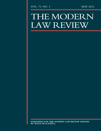
MODERN LAW REVIEW
Exploring the Frontiers of Legal Thought.MODERN LAW REVIEW, a prestigious academic journal published by Wiley, stands as a significant platform in the field of law, dedicated to exploring contemporary legal issues and fostering scholarly discourse since its inception in 1937. With an impressive Scopus Rank of #237 out of 1025 in the Social Sciences - Law category, placing it in the 76th percentile, the journal has consistently maintained a reputation for high-quality research, currently positioned in Q2 of the category quartiles as of 2023. The journal's comprehensive coverage spans various legal topics, making it essential reading for legal scholars, practitioners, and students alike. Although it is not an open-access journal, its contributions are invaluable for guiding the future of legal scholarship. With a robust history of converged years from 1995, 1997 to 1999, 2001 to 2002, 2004, and 2011 to 2024, MODERN LAW REVIEW remains at the forefront of legal research, addressing pressing issues and influencing legal thought across disciplines.
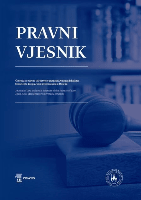
Pravni Vjesnik
Empowering Legal Scholarship, Open to All.Pravni Vjesnik is a peer-reviewed academic journal published by the Pravni Fakultet Sveučilišta Josipa Jurja Strossmayera & Osijek, primarily focusing on the field of law within the social sciences. Since transitioning to an Open Access model in 2016, the journal has broadened its accessibility, allowing researchers, professionals, and students to engage with diverse legal scholarship without subscription barriers. With an ISSN of 0352-5317 and an E-ISSN of 1849-0840, Pravni Vjesnik plays a crucial role in disseminating knowledge and fostering discourse in the legal community, particularly within the context of the Croatian legal system and broader European legal frameworks. Although it holds a rank of #760 out of 1025 in the Scopus database, placing it in the 25th percentile of law journals, its commitment to quality and relevance ensures its importance as a resource for rigorous academic inquiry. The journal's scope is anticipated to expand from 2019 to 2024, promoting ongoing research in contemporary legal issues. This dedication to publishing comprehensive and impactful studies makes Pravni Vjesnik an essential platform for those involved in the legal field.